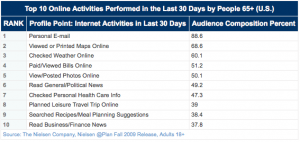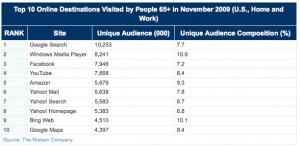A lot of people and businesses assume that the internet is a place where youth and business professionals work, promote themselves, and play. I have a hard time myself envisioning my 86 year old grandmother exploring the vast expanses of the internet, so if your business hasn’t taken seniors into account, then know you are not alone.
Interesting studies and conversations are cropping up all the time proving that seniors are not only using computers, but are a significant portion of the online presence. Mike Sachoff discusses the presence of seniors online and breaks down where they are going online and what they are doing. In his article, he presents a detailed table breaking down the activities of seniors online:

Even better, he has a list of the top websites they use:

Two of the biggest contributors to SEO and social media rank in the top 3 of this list: Facebook and Google. Ah…now there’s the connection we were looking for in the SEO field! Since seniors have increased their web presence to 17.5 million people over the last five years, according to Nielson, and are now spending 58 hours a month online in 2009 (increased from 52 hours a month in 2004), then they are indeed a demographic to be reckoned with when mapping out your online marketing strategies.
More importantly, it seems that seniors are doing the same things online as other demographics: getting information, visiting blogs, planning travel, and socializing. Only they have more free time available to them than those of us who are in the middle of our careers and raising kids. What will make you think even more are statistics that indicate 8.2% of all social networking and blog visitors fall into the seniors category, which is only 0.1 percent lower than the number of teenagers visiting the same kinds of sites. We know that marketing is aimed heavily at teenagers, so considering that seniors make up almost the same numbers for social networking sites, perhaps our businesses need to consider them too.
Although seniors will likely find most businesses through their general SEO strategies, it is worth noting that a different age group may search under different key words and key word phrases than their younger counterparts, so planning your SEO key words and phrases to reflect a wider audience is important. After all, while my 86 year old grandmother may have more time to spend online, I’d bet that if she doesn’t find your company at the top of her Google search, then she is unlikely to dig any further and your business may lose out to others who have tailored their SEO strategy to include this demographic.
